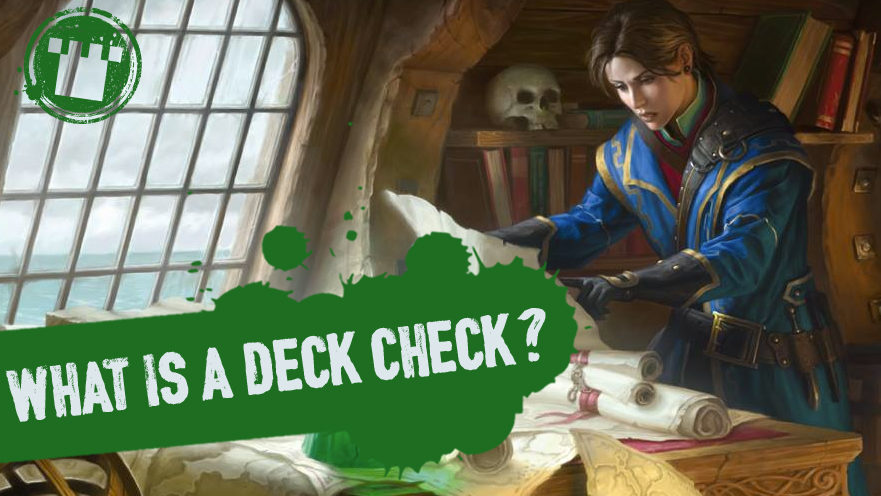You’re at a Magic event, and you sit down for your match across from you opponent. You go through your pre-game routine: pulling out your playmat, deck box, and life pad. You remove your deck from the deck box and begin shuffling. The Head Judge announces for the round to begin and with shuffling done, you present your deck to your opponent…and a Judge comes up to your table and you hear:
“Hello, your table has been randomly selected for a deck check. Can you both please put your decks back into your respective deck boxes along with your sideboard and any additional tokens or cards you normally carry in your deck box? I will be back shortly with your decks. Thank you for your patience and understanding.”
Deck checks have a slight air of mystery about them, and while many players have heard of them, not everyone knows exactly what’s involved. Today, I’d like to go over Deck Checks in detail: what happens during a check, what they mean to you, and what you can do to help ensure that your check goes smoothly.
A Deck Check occurs when a table is randomly selected for inspection, either at the beginning or middle of a match, and the contents of those decks are compared against the submitted decklists. In Competitive and Professional Rules Enforcement Level events, players are required to submit a decklist detailing the contents of the deck they will be playing with in that event. Decklists are gathered during the player meeting, sorted alphabetically by players’ last name, and (depending on the size of the event) counted to verify that there are at least 60 cards in each player’s main deck and no more than 15 cards in their sideboard.
Policy: MTR (Magic Tournament Rules): Section 2.8 Deck Checks:
Deck Checks must be performed at all Competitive and Professional Rules Enforcement Level tournaments, and the Head Judge has the option to perform Deck Checks at Regular Rules Enforcement Level tournaments. At least ten percent of all decks should be checked over the course of the tournament. A full deck check should not be performed if a player has drawn an opening hand and potentially made mulligan decisions.
Here are a few things you can do to make sure your deck check goes smoothly:
- Make sure your deck matches the decklist you have submitted. Check your deck the night before the tournament and consider asking a friend or two to help double-check your work.
- Make sure your decklist is legible and completely filled out. If you need to make a change, make sure you completely cross out an item. Make sure that your name and DCI number are included, too.
- Bring a single deck box. Bringing deck boxes that can hold multiple decks is the easiest way to get penalized. You want to get a deck box that was made for tournament play, that just holds the deck you are bringing and nothing else.
- Remove anything that isn’t a part of your deck from your deck box. Tokens and emblems are okay, but any other cards in your deck box will be considered part of your deck.
- Sleeve your deck in identical sleeves and bring extras. If you choose to double-sleeve your deck, then your entire deck and sideboard should be double-sleeved.
- If you’re using double-faced cards in your deck, make sure that you:
- Either use the actual cards in opaque sleeves or use checklist cards.
- If you use checklists make sure that they clearly denote the card they represent, even if they are the only double-faced cards in your deck.
- Make sure that you have enough copies of the actual card to match the number of checklists you are using.
Errors found during deck checks will result in the penalty of a Game Loss or a Warning, depending the nature of the infraction and severity of the problem with your deck. It is up to you to avoid these penalties by following the guidelines above.
After checking your deck, the judges will bring the decks back and let you know if there are any issues. Otherwise, they will instruct you to resume playing: “Thank you for your patience. Here are your respective decks. No problems were found with the decks. I will issue you the appropriate time extension for your match. Please shuffle your cards and begin your match.”
Policy: MTR Section 2.6 Time Extensions: “If the match was interrupted to perform a deck check, players are awarded time equal to the time the deck check took plus three minutes.”
Typically, unless there is a problem, deck checks take about seven minutes or less. This may seem like a long time when you are sitting there, but it’s not a very long time at all in the context of a round. Judges want you to get back to playing Magic as much as you do, so a little bit of patience goes a long way
Wizards of the Coast want everyone to play Magic by the same standards and conditions. Judges are there to make sure that this happens, and deck checks are a tool that judges have to ensure that everyone is playing fairly and correctly.
Header design: Justin Treadway
Header image: “Chart a Course” by James Ryman

